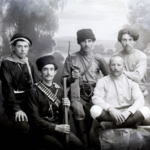 i.d.a.-Dachverband: Verbundkatalog META (Web)
i.d.a.-Dachverband: Verbundkatalog META (Web)
„Bildet Banden!“, fordert die Musikerin Sookee – und führt in 2.48 Minuten virtuell durch den Verbundkatalog META des i.d.a.-Dachverbandes (Web). Dabei trifft sie auf zentrale Pionierinnen und Werke der feministischen Bewegungen und zeigt: Von der Abschaffung von § 218 bis zum Kampf gegen Antifeminismus – aktuelle Forderungen haben eine lange Tradition.
Seit Jahrhunderten treten Feminist*innen mutig gegen Vorurteile und Verbote und für Selbstbestimmung, Teilhabe und demokratische Rechte ein. Diesen unerschrockenen Feminismus braucht es auch aktuell, wenn weltweit patriarchal-autoritäre Systeme und Strömungen erstarken. Kriege, Krisen und Katastrophen befördern antidemokratische Entwicklungen, Sexismus, Rassismus und Antisemitismus. Dies gefährdet ganz konkret auch die oft hart errungenen Rechte von Frauen und LSBTIQA*. Feministische Netzwerke stärken und verbinden im Kampf um Frauen-, Menschen- und Freiheitsrechte – auch dafür steht der #8März. „Wir haben noch so viel zu tun“, sagt Sookee im Video, „das Patriarchat schafft sich nicht von alleine ab!“ Das DDF hat mit diesem Video zum #8M2024 die Kampagne “#unerschrocken – Feminismus stärken” gestartet (Web).
Digitales Deutsche Frauenarchiv (DDF) – und Online-Verbund-Katalog “META”
Das DDF ist das Onlineportal zur feministischen Bewegungsgeschichte. Es zeigt Materialien aus den feministischen Erinnerungseinrichtungen des i.d.a.-Dachverbands aus Deutschland (Web). In i.d.a. vernetzt sind auch Einrichtungen aus Österreich, der Schweiz, Luxemburg und Italien. Aus Österreich sind STICHWORT, Frauen*Solidarität, Sammlung Frauennachlässe und AEP Mitglieder von i.d.a. Kern des DDF ist der Online-Verbund-Katalog “META” (Web).
Das Video ist eine Produktion des DDF, 2024. Konzept DDF: Steff Urgast | Regie & Stop-Motion-Fotografie: Julia J. Geiß | Animation & Illustration: Lala Miñoso | Musik: Spoke, Slomo Studio | Bildmaterial: Einrichtungen des i.d.a.-Dachverbands, www.metakatalog.eu | Alle Rechte vorbehalten. Gefördert vom Bundesministerium für Familie, Senioren, Frauen und Jugend (BMFSFJ).

 Frauenhetz in Koop. mit STICHWORT
Frauenhetz in Koop. mit STICHWORT  Svenja Bethke (Univ. of Leicester) and Eliza McKee (New York Univ.)
Svenja Bethke (Univ. of Leicester) and Eliza McKee (New York Univ.)